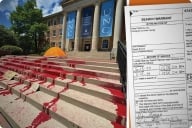You have /5 articles left.
Sign up for a free account or log in.
The Association of Private Sector Colleges and Universities announced the resignation Friday afternoon of its chief executive, Harris N. Miller -- and by the time the release hit e-mail inboxes, Miller was already out the door.
Coming within days of what many characterized as a political victory for the association, in achieving a softening of federal rules for vocational programs, and soon after the end of the group's annual convention, Miller's sudden departure led to much speculation that he had been forced out. But association officials insisted that those events made this the right time for him to leave.
In an interview between errands late Friday, Miller characterized his departure after four-plus years as very much his own, motivated in large part by exhaustion after nearly two straight years of nonstop political battling over the future of the for-profit-college sector and federal attempts to regulate it more aggressively. "It has basically been nonstop in terms of the demands on my time and energy," he said. "I'm beyond exhausted."
Miller disputed the suggestion, made by several career college officials, that the association's board had asked him to leave after concluding that the group needed a new executive -- more of a "statesman," and someone with a higher profile -- to lead it forward.
"Yes," Miller said, when asked if he left by choice. "I'd mentioned [a desire to leave] to the board leadership a couple times." But he acknowledged that it was "a mutual decision; they're ready to move on," he said of the board.
In the news release, APSCU officials applauded Miller's leadership, and they too challenged the notion that he had been forced out. But Miller's departure was negotiated, and as is often the case with such agreements, Miller's is likely to preclude either side from doing anything but singing the praises of the other.
Asked if Miller had left "(1) on his own, (2) at the urging of the board, or (3) as a result of mutual agreement," Arthur Keiser, chancellor and CEO of Keiser University and chairman of the APSCU board, said the answer was "both (1) and (3). Harris had a very elaborate and strong employment contract, and we came to agreement on that. There are no big sinister issues here. We had discussed it for a long time. Harris resigned and we accepted it."
Miller took over as head of what was then the Career College Association in early 2007, replacing a predecessor who was seen as a strong (if prickly) defender of the colleges but far from a bridge-builder. Miller, who had headed two information technology associations and staged an unsuccessful run for U.S. Senate in Virginia, vowed to work more closely with traditional higher education groups and build ties to Congressional Democrats who had often viewed the sector with disdain.
But as has often been the case with for-profit colleges, they found themselves on the defensive not long into his tenure, as the new Obama administration -- urged on by consumer and student advocates, including some working in its upper ranks -- made a sharp break with the policies of its predecessor to pursue aggressive regulation of the sector.
The colleges also took an absolute pounding in highly critical U.S. Senate hearings and in a series of high-profile television and published reports that questioned institutional practices. Together, the negative headlines and regulatory risk drove stock prices of leading higher education companies down sharply over the last two years.
Miller and APSCU were at the center of the sector's defense, aggressively lobbying Congress and waging a wide and varied advertising campaign to argue the unfairness and illogic of the government's regulations requiring vocational programs to show that they prepare graduates for "gainful employment." The organization helped create an organization of students to lobby as well, and solicited support from an array of minority and business groups.
"We showed people that we were a very serious organization in terms of representing students and schools, and that we could play game the way it needed to be played," Miller said. "We showed we can play in the big leagues with anybody."
Although career college leaders are loath to admit it -- they have threatened a lawsuit challenging the gainful employment rules -- many observers viewed the Education Department's softening of the regulations as a victory for the sector. But within for-profit higher education, some officials attributed the sector's success more to groups other than APSCU -- notably to the Coalition for Educational Success, a new group of institutions that emerged to fight the government rules.
Miller and Keiser both noted that APSCU had expanded its membership to record-high levels and that the association was well-positioned for the future. It appears, though, that the board decided that Miller was not the best person to lead it into that future. Asked what the association would look for in a new president, Keiser said it would probably be someone a lot like Miller, whom he described as "an exceptionally bright man, very political, a good organizer." It would probably benefit from somebody "a little more Republican than Democratic," he said, given how the political winds are blowing.









